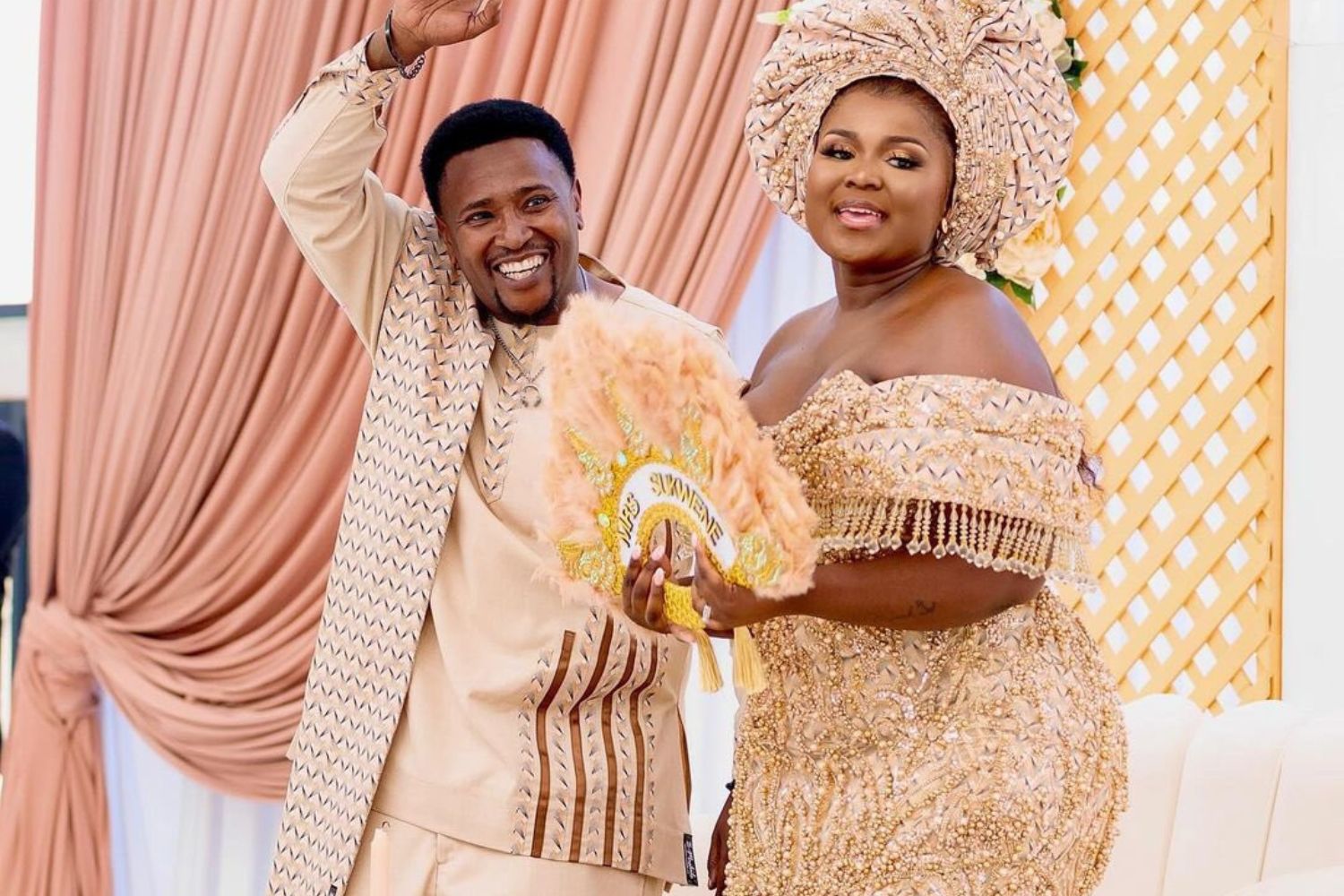The wedding sparked a broader discussion on social media platforms about cultural appropriation and the boundaries of cultural exchange.
Musa Sukwene, the Idols SA winner, and his bride Tshiamo Makama recently tied the knot in an intimate ceremony that has ignited a heated debate about cultural appropriation in South Africa.
The couple’s choice of attire, designed by BMashilo Designs, featured a bold blend of South African and Nigerian cultural elements, drawing both praise and criticism from fans and social media users alike.
Controversial wedding attire choices
The newlyweds’ outfits, particularly Makama’s traditional Nigerian gele (headwrap) paired with a gown incorporating intricate beading, lacework, and ShweShwe print, became the focal point of the controversy.
While some celebrated the cross-cultural fashion fusion, others expressed outrage over the couple’s decision to wear “Nigerian attire” for their South African wedding.
Nigerian fashion designer Ify Ubby, founder of OliveAnkara, explained to Vogue the cultural significance of the gele, describing it as a symbol of elegance and maturity worn by adult women in Nigerian culture.
“The headwrap, which is called gele, is a part of a woman’s traditional attire in my culture. Female adults, typically aged 20 and above, wear the gele as a sign of elegance and maturity. Women often wear a uniformed coloured gele if they are among an organisation or at an event, such as a wedding or party,” said Ubby.
However, this explanation did little to quell the concerns of some South African and Nigerian netizens who viewed the couple’s attire as inappropriate.
ALSO READ: ‘She really did that’: Husband and SA awed by American makoti’s fluent Sepedi wedding speech
Social media backlash and cultural appropriation debate
The wedding sparked a broader discussion on social media platforms about cultural appropriation and the boundaries of cultural exchange.
Many users questioned the appropriateness of wearing traditional attire from a culture not one’s own, with some drawing comparisons to hypothetical scenarios of cultural mixing in other contexts.
Comments ranged from calls for designers to “Stop making geles for South Africans” to more nuanced discussions about the implications of wearing another culture’s traditional dress, especially when neither the bride nor groom belongs to that culture.
“Designers need to stop making geles for South Africans,” said @keahendricks on X.
“As a South African, what business do you have wearing a gele, when you’re not even marrying a Nigerian man??? We literally have our OWN traditions!!,” Koketso added to the debate.
“Imagine a Nigerian woman wearing an entire Zulu attire while marrying a Nigerian man. I personally don’t think it makes sense, and not just for other nationalities but other cultures; if neither the groom or bride are part of that culture, they shouldn’t wear that culture’s attire,” @KgopoloMphuthi said.
“Why they wearing Nigerian tradition?,” @sewelankoana questioned.
Why they wearing Nigerian tradition?
— SewelaNkoana (@sewelankoana) October 7, 2024
Designer’s response and broader cultural context
In response to the criticism, the designer told News24 defended the couple’s choices, labelling the negative comments as perpetuating afrophobia.
She emphasised that celebrating elements of another culture does not necessarily mean disregarding one’s own.
“African cultures have always been about the cross-cultural exchange, and this fusion is not new or taboo—it’s an acknowledgment of our shared history as a people,” she said.
ALSO READ: ‘It’s a great testament’ – Danté Poole on his first SAFTA nomination
Heritage Day controversies
This incident has reignited an ongoing debate in South Africa about cultural appropriation, which extends beyond international boundaries to include discussions about inter-cultural exchanges within the country itself.
The controversy highlights the complex nature of cultural identity and expression in a diverse nation like South Africa.
A TikTok creator, Chulu Ntutela, expressed strong opposition to white South Africans wearing traditional attire of other cultures during these celebrations, viewing it as a form of cultural appropriation rather than genuine cultural sharing.
“I do not want to see any white person wearing our culture on Heritage Day. The cultural appropriation I see on Heritage Day bores me; it disgusts me.”
“The fake unity you have on Heritage Day is the same one you have with rugby [when the Springboks play]. I want you to ask yourselves that when you do this sharing, ask yourselves what you’re ever given. What has ever been shared with you? And when you look at the wealth distribution of this country, there is no sharing there,” she said.
Nttutela garnered well over 2000 comments under her video, most of which concurred with her sentiments.
See the comments below:
@Zama: “It started when they turned Shaka Day into Heritage Day. Kwaqala lana.”
@Jongwanaa: “’I don’t know how to embrace my South African heritage’ BECAUSE AWUNAYO!”
@Vuyo Mqobi: “Strongly agree because they just put anything on without understanding its meaning, i.e umbaco wentombi nombaco womfazi.”
@cntutela Worse, I saw people I know in that comment section, so ndixakiwe nyani. I have so much more to say on this, but the video was already getting long, but I’ll use your comments to expand on my some of my points. #heritageday #heritage #southafrica #traditionalclothes #traditionalattire #fyp ♬ original sound – ManicPixieNightmare🧚🏾
